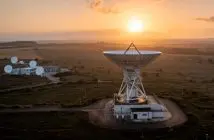
Australian space tech startup Arlula has announced it has raised AUD$2.2 million (USD$1.5 million) to expand access to Earth Observation (EO) data and imagery, allowing individuals, small businesses and large enterprises alike to harness its full potential.
The funding was led by Main Sequence, Australia’s deep tech investment fund founded by CSIRO, with participation from Black Nova Venture Capital.
Satellites have transformed the way we monitor the Earth’s surface and respond to developments across the planet.
High-res aerial imagery enables governments and organisations to understand a multitude of changes on our planet’s surface, from environmental degradation and wildlife movement, to natural disasters and urbanisation.
By capturing and providing greater access to EO imagery and data, industry leaders can make better-informed decisions, drive innovation and improve their financial performance.
Arlula was co-founded by Sebastian Chaoui and Arran Salerno, an engineer and lawyer who met as students at UTS. Chaoui, who previously led Australia’s first-ever mission to the International Space Station, commented: “Throughout my years working in the space industry, I realised that despite there being thousands of satellites monitoring the Earth’s surface, the data they were capturing was not being effectively operationalised and monetised. Arlula was founded with a mission to rapidly deliver comprehensive imagery and data, enabling businesses to make data-driven decisions faster than ever before.”
Commercialisation comes with challenges, particularly for an industry born servicing government needs. That’s where Salerno’s commercial and legal background was imperative, “We figured by applying a customer first approach we could build infrastructure to connect both sides of the market through new SAAS technology and a commercially accessible business model,” he said.
The new funding will be used to scale into new markets and expand the capabilities of Arlula’s Geostack Terra platform.
With both live data and archive imagery dating as far back as the 1970s, the platform provides unprecedented access to EO data.
For example, businesses now have the ability to monitor remote infrastructure that can be hard or hazardous to reach, such as offshore oil rigs, mines and pipelines.
This reduces the need for physical inspections and saves companies valuable time, money and resources, allowing them to instead focus on creating actionable insights that drive business outcomes.
Main Sequence Partner Martin Duursma said, “We are right in the middle of the next wave of growth in the global space industry, Arlula is one of the companies leading the way with easier access to space based data that enables new insights and information that delivers critical commercial outcomes.”
Head of the Australian Space Agency Enrico Palermo said, “Earth Observation data and technologies are critical to a range of applications from agriculture and resource management practices to natural disaster response and climate science. Arlula’s innovation is a great example of space technology that is finding a market that private investors are willing to back while also delivering benefits to Australians here on Earth.”
Arlula counts the Commonwealth Scientific and Industrial Research Organisation (CSIRO) as part of its existing EO partners and you can access archive data dating back from National Aeronautics and Space Administration (NASA)’s 1972 Landsat Program.





